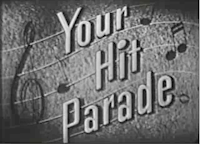Rock 'n' Roll Was In and "Your Hit Parade" Was Out, 50 Years Ago
 Fifty years ago today, Variety ran its last review of Your Hit Parade a veritable obituary that appeared with the title, "Hit Parade Dies As Rock 'n' Roll Takes Its Toll of Longrunner."
Fifty years ago today, Variety ran its last review of Your Hit Parade a veritable obituary that appeared with the title, "Hit Parade Dies As Rock 'n' Roll Takes Its Toll of Longrunner."
In the 1930s and 40s, "Your Hit Parade" was one of radio's mainstays-- a Saturday night fixture that had listeners wondering what popular song would be the new #1 hit, counted down from a list of seven current singles. The tabulation by the ad agencies that represented American Tobacco were vague at best, but this didn't seem to deter audiences who tuned in to hear such tunes as "Buttons and Bows," "Some Enchanted Evening," and perennial "White Christmas" (that appeared on the list a record 38 times). Notably among the singers featured on the show was youthful Frank Sinatra, and as John Dunning's The Encyclopedia of Old-Time Radio describes it, "Sinatra roared into the show in 1943, bringing a screaming crowd of bobbysoxers."
The series began a trial run on television starting in the summer of 1950, becoming a regular series in the fall. The main series regulars, who sang the hit songs, became "stars" of early television and included Snooky Lanson, Dorothy Collins, Russell Arms, and Gisele MacKenzie.
When Collins' sang Bill Haley's "Rock Around the Clock" on the 1955 season opener, Variety called it "one of the highlights of the show." The following year's season opener featured two Elvis Presley hits: Snooky Lanson performed "Hound Dog" and Russell Arms did "Don't Be Cruel," and the writing was on the wall. Frequently, the show would do a take-off on a rock 'n' roll hit as Gisele MacKenzie did with a has-to-be-seen-to-be-believed "horror-movie" send up of Elvis's "Heartbreak Hotel" (link); other times they would play them straight (link to Snooky Lanson singing "Heartbreak Hotel").
 In its heyday, though, Your Hit Parade, occupying the 10:30 timeslot on Saturday nights for most of its run, was a popular favorite of Television's Golden Age. Tony Charmoli was the choreographer for many years on the series and won the 1955 Emmy Award for his work. He spoke in detail about the series in his Archive interview starting at 24 minutes into
In its heyday, though, Your Hit Parade, occupying the 10:30 timeslot on Saturday nights for most of its run, was a popular favorite of Television's Golden Age. Tony Charmoli was the choreographer for many years on the series and won the 1955 Emmy Award for his work. He spoke in detail about the series in his Archive interview starting at 24 minutes into





























